Enhancing institutional capacity of public authorities and stakeholders and efficient public administration.
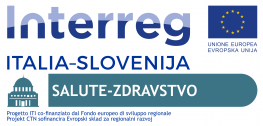
The project aims to strengthen the offer and to improve the quality of social and health services for the population living in the area of the EGTC GO and in the border areas where the public bodies involved operate. The project specifically aims to strengthen the institutional capacity for cooperation by mobilising public authorities and operators in order to plan shared solutions to common needs in the health and social services sector.
The project involved the establishment of joint cross-border medical teams in the field of mental health, autism and normal pregnancy, as well as the creation, on an experimental basis, of a Single Centre for cross-border reservations. In the perspective of integration with the social-assistance sphere, the project dedicates a pilot action to cross-border services and interventions for the inclusion of vulnerable groups in the population.
1. CUP: cross border health services;
2. Mental health: publication of the call for projects “individual health budget”, cross-border agreement and training course for workers who are not responsible for mental health issues;
3. Autism: training course on the ESDM method, medical protocol for the treatment of autistic children and adaptation of rooms in Gorizia for the operation of integrated teams;
4. Normal pregnancy: cross-border agreement;
5. Social inclusion: training event, three thematic workshops and start of work for the construction of an info-point in Gorizia.
The results that were achieved are:
- greater skills and qualification of cross-border teams in the health and social field;
- analysis of the state of the art, methodologies and clinical, administrative and legal aspects in the health system in Slovenia and Italy and in the social-welfare sector;
- comparative analysis of the two health and social care systems (Slovenian and Italian);
- establishment of cross-border interdisciplinary teams and working groups;
- administrative and technical solutions to create cross-border health services;
- cross-border booking system ( CUP) for health and social services;
- infrastructures dedicated to cross-border services
The project is implemented by EGTC GO as a sole beneficiary.
Implementing bodies: ASUGI, Splošna bolnišnica "dr.Franca Derganca Nova Gorica", Zdravstveni dom Nova Gorica, Psihiatrična Bolnišnica Idrija.
Lead Partner
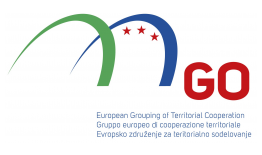
| Salute mentale. Formazione linguistica: vademecum dei termini medici principali in italiano e in sloveno WP_3.2.5._Formazione_linguistica_Vademecum_web.pdf ( 602 bytes, published on 21 January, 2019 - 14:15 ) | |
| Individuazione modalità operative di collaborazione delle equipe transfrontaliere, formazione e attuazione WP3.2.3_Accordo_SM_sporazum_DZ_final_web.pdf ( 358 bytes, published on 21 January, 2019 - 14:15 ) | |
| Carta dei servizi transfrontalieri WP_3.1.1._Carta_dei_servizi_transfrontalieri_IT_SL_web_logos2.pdf ( 1 byte, published on 22 February, 2019 - 11:29 ) | |
| CUP transfrontaliero sintesi analisi WP_3.1.1_Sintesi_Finale_IT_SL_web_logos3.pdf ( 959 bytes, published on 22 February, 2019 - 11:29 ) | |
| abstract analisi salute mentale WP_3.2.1_abstract_analisi_salutementale_IT_SL_web_logos2.pdf ( 987 bytes, published on 22 February, 2019 - 11:29 ) | |
| Agenda formazione WP_3.2.4._Formazione_operatori_Agenda_11122018E.pdf ( 156 bytes, published on 22 February, 2019 - 11:29 ) | |
| Protocollo autismo WP_3.2.12_protocollo_AUTISMO_protokol_AVTIZEM_web_logos.pdf ( 184 bytes, published on 22 February, 2019 - 11:29 ) | |
| Brochure autismo WP_3.2.13._BROCHURE_Autismo_-_Avtizem_web_logos.pdf ( 505 bytes, published on 22 February, 2019 - 11:29 ) | |
| Programma eventi autismo WP_3.2.13._Programma_eventi_AUTISMO-IT-SL-web-logos.pdf ( 753 bytes, published on 22 February, 2019 - 11:29 ) | |
| Analisi gravidanza fisiologica WP_3.2.16_Analisi_normativa_Gravidanza__IT_SL_web_logos2.pdf ( 972 bytes, published on 22 February, 2019 - 11:29 ) | |
| Accordo gravidanza fisiologica WP_3.2.18_Accordo_congiunto_web_logos.pdf ( 146 bytes, published on 22 February, 2019 - 11:29 ) | |
| WP_3.3.1 Vademecum dei servizi e programmi socio-assistenziali Nei comuni di Gorizia, Nova Gorica, Šempeter- Vrtojba GECT_IMPAGINATO_ITA-unito.pdf ( 5 bytes, published on 24 May, 2019 - 14:54 ) |
CUP
The activity was aimed to overcome administrative and operational obstacles, in order to give to the citizens of the EGTS area the possibility to book and use cross-border health services from both parts of the border, regardless of the state of origin, thus putting into practice the principle of the free movement of patients from the EU Directive 2011/24. The healthcare offerings of the two territories, the booking systems and the supplying system of Italian and Slovenian healthcare services were analyzed, in order to find administrative and legal solutions that would allow the creation of a network of cross-border healthcare services. All activities were carried out in close collaboration with the Slovenian Ministry of Health and with the Central Health Administration, Social Policies and Disabilities Department of the Friuli Venezia Giulia Region, and with the entities that deal with the technical, administrative and financial aspects of booking and providing health services: Insiel, the Slovenian National Institute for Public Health NIJZ (Nacionalni inštitut za javno zdravje Republike Slovenije) and the Slovenian Institute for Health Insurance ZZZS (Zavod za zdravstveno zavarovanje Republike Slovenije).
An agreement was reached on how to implement the cross-border booking system.
On the basis of the indications provided by the analysis and taking into account the technical characteristics of the two Italian and Slovenian IT systems,the cross-border procurement system was designed as an intermediate environment for EGTC GO, which connects the existing platforms (CUP FVG and eNaročanje) and thus allows residents in the territory of EGTC GO to access health services on both sides of the border. The system has been opened to the public in April 2021.
At the end of the project a crossborder analisy of the encountered obstacles was made to describe and offer sollutions for possible future expansions of the project and sistem.
MENTAL HEALTH
Thanks to the project, a joint Italian-Slovenian team was created with the task of drawing up common guidelines for taking care of patients between 18 and 35 years of age with mental health problems. The guidelines describe the actions that need to be carried out in the event of an acute situation and provide for the socio-professional reintegration of young people with mental health disorders.
The first project activity consisted of an analysis of the differences and synergies of the methods of treatment of people with mental health problems in Italy and Slovenia. The aim was to understand if and how it is possible to activate a joint service for the treatment of Italian and Slovenian patients. T cross-border team developed a joint model capable of increasing the quality and accessibility of cross-border services.
The model required that the multidisciplinary team carried out the following activities:
• Information and prevention activities. Promotion of informative meetings with other local figures (health district, schools, general medicine doctors, social services). Carried out on 11/12/2018.
• Community intervention in the crisis. On 7 September 2020, the cross-border task force of the Salute-Zdravstvo project, composed of experts in the mental health field, signed the "cross-border implementation protocol for the management of acute mental health cases" which will enable the use of the same methods of treatment in the cross border territory of EGTC GO;
• Socio-professional reintegration. According to the guidelines developed by the mixed team, personalized rehabilitation projects will be activated, aiming at the re-acquisition of social skills/job capacity by the patients. This will be achieved thanks to a personalized rehabilitation health budget, tool that is widespread in Italy, but which an absolute novelty for Slovenia. In February 2019, Slovenian members of the cross-border team participated in a training session on use of the health budget.
In September and October 2019, the training course for the joint medical team on community mental health practices, deinstitutionalization courses, and individual rehabilitation courses took place.
During the project, both the Slovenian and Italian sides identified users who meet the criteria and included them in individual activities that have been going on since the beginning of 2020. A total of 18 young users with mental health problems have been involved so far, as part of work inclusion activities.
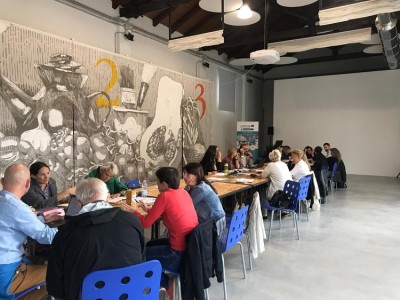
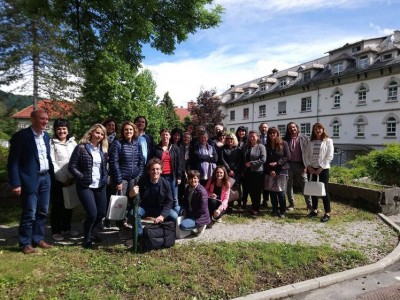
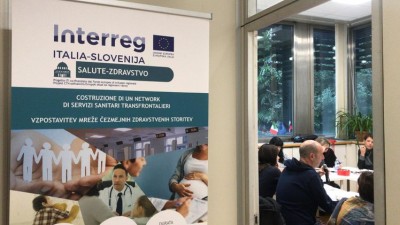
As part of mental health, the infrastructural arrangement of premises intended for the work of a joint cross-border group is also envisaged. The premises will be part of the mental health center on the ground floor of the Community Center in Nova Gorica. The works are proceeding according to plan and are expected to be completed in 2021. The arrangement of the premises was carried out by a joint public procurement of EGTC GO and the Municipality of Nova Gorica.
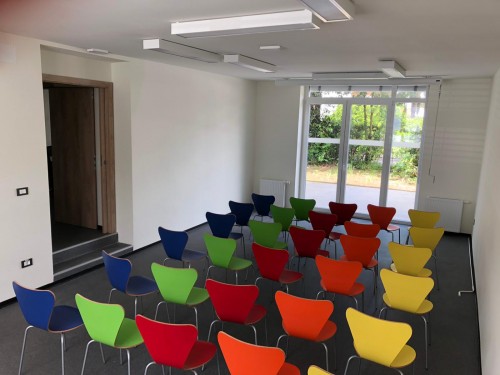
AUTISM
The project aimed to introduce the early diagnosis (as early as 18 months of age) of the autism spectrum disorder. International studies continue to confirm that early treatment can significantly improve communication, relational, cognitive and adaptive skills. One of the most important objectives was to raise awareness of the importance of early diagnosis of primary care pediatricians as well as families and other operators who, for various reasons, use being in contact with children.
A working group of experts was set up to draft a joint medical. The protocol plans the use, already in very young children, of the M-CHAT, one of the most internationally advanced tools for the diagnosis of the autism spectrum disorders. For the treatment it recommends the use of the ESDM method, which is currently the most effective in babies from 18 months onwards. For this end, the joint cross-border medical team took part in the ESDM course, taught by one of the most accredited American experts in this field at an international level. At the end of the course, experts will obtain a license to treat children with autistic spectrum disorder through this method. In december 2020 the cross border medical team participated in the training for the use of the AAC method.
At the Basaglia Park in Gorizia, spaces have been redecorated for the joint medical team to use during the treatment of children with autism spectrum disorders from both the two states, through the ESDM method. Didactic material was purchased for the application of the ESDM method. The works were completed in July 2019. The new spaces were inaugurated on 21.11.2019 The cross border team continued to work together in the new spaces and aditional equipment was pourchased for the work with the ESDM sistem.
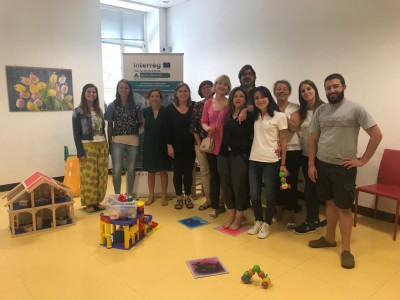
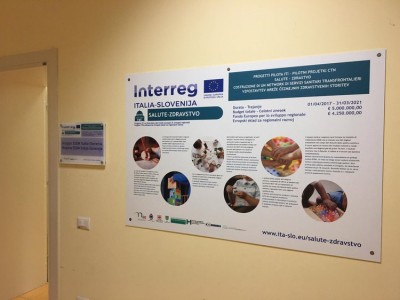
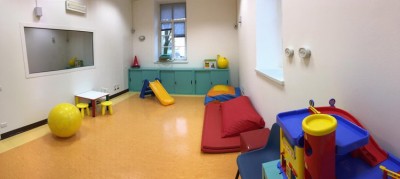
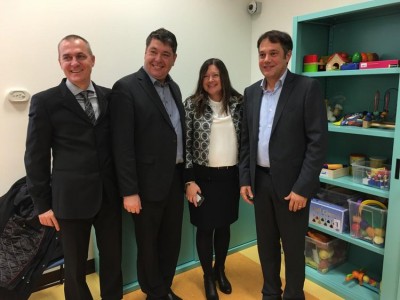
PHYSIOLOGICAL PREGNANCY
Thanks to the project, pregnant women in the territory of the three municipalities are able to benefit from pre and postpartum services, provided by a cross-border group of obstetricians and gynecologists who will take into account the best European practices. Currently these services are not present in Slovenian or Italian territory, as they represent an innovative method in today's obstetric practice.
The first project activity analysed the differences and synergies of the treatment methods for pregnant women in Italy and Slovenia. A transnational working group was established, who has developed a joint treatment model for normal pregnancy, which provides for the innovative services that will be provided by the joint cross-border medical.
At the end of 2018, the cross-border agreement was signed for the adoption of the model, which is based on the excellences of the two territories, but above all takes into account the models adopted in the three most advanced European centers in the treatment of physiological pregnancy in Holland, Denmark, England , which the working group had the opportunity to visit between May and June 2018.
In April 2019, the working group identified the activities that will be jointly provided. Information materials have been prepared to inform women about the cross-border services offered. Services include: Gymnastics for pregnant women, Aquatic courses in pregnancy, Aquatic courses for newborns and Meetings for Support groups.
On 12.12.2019 the agreement was signed between Splošna bolnišnica "Dr. Franca Derganca" Nova Gorica and the Healthcare Agency n. 2 "Bassa Friulana-Isontina" for carrying out the swimming pool activities foreseen in the action of physiological pregnancy.
In December 2019 the first scheduled activity started - Meetings with pregnant women. Because of the Covid pandemic, at the beginning of 2020, the activities of gymnastics and meetings with pregnant women have been transferred online.
With the aim of connecting and delineating the differences and similarities of the two systems, in September 2020, the linguistic handbook was created with expressions relating to the path of pregnancy, childbirth and post-partum.
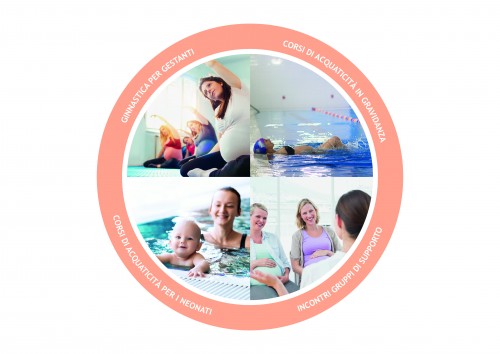
The project plans the construction of new infrastructures where the activities of the cross-border multidisciplinary mixed team will be carried out. At the Basaglia Park spaces will be renovated to house the "Birth Path" center for pre-birth activities. The infrastructure is in the final phase. The maternity ward of the General hospital "dr. Franca Derganca" Nova Gorica was reconstructed to give new mothers and there babies more comfort and new equipment was purchased that gives the possibility of a fisiological birth.
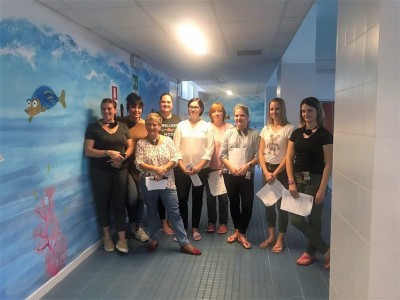
SOCIAL INCLUSION
The action, which took place in collaboration with the three founding municipalities of the EGTC GO, made possible a network of cross-border social services for the population of the EGTC GO area, in particular for the weaker groups. The result of the action is a cross-border protocol, which will provide for the joint supply of social services, involving all the managing bodies of social services and private associations. Three information points were created where citizens are able to obtain information on the possibility of providing social services and on the type of cross-border services.
A permanent cross-border working group has been set up consisting of staff from the three municipalities, which will deal with the construction of a network of social services that require joint assistance.
Training and in-depth moments dedicated to the social services operators of the three cities were organized. The first training session was organized on May 13, 2019 in Nova Gorica followed by various thematic tables in June and September on the themes of "Seniors and disabilities", "Social unease and poverty" and "Minors and families".
On the 30th June 2020 the three municipalities of Nova Gorica, Gorizia and Šempeter-Vrtojba signed the Protocol for social inclusion.
Three information points will be created in the three municipalities, where citizens will be able to receive information on existing services throughout the area and how they can use them. By creating a cross-border social network, Italian and Slovenian citizens will be able to use the services provided by all three municipalities. In Nova Gorica, the information point will be hosted at the Skupnostni center, which will be affected by important infrastructural works thanks to additional funds from the Municipality of Nova Gorica, which intends to carry out important interventions to adapt the building. The call was published in December 2019. In March 2020 the works on the Comunity center of Nova Gorica, that will host the second Info point, have started.
In Gorizia the infopoint was created on the ground floor of the Multipurpose Center of Gorizia. The works ended in October 2019 and the spaces were inaugurated on 18.12.2019.
In the Municipality of Nova Gorica, the information point is located in the Community Center, where infrastructural works were carried out with the help of additional funds from the Municipality of Nova Gorica, which made a whole renovation of the building possible.
In the Municipality of Šempeter-Vrtojba the Info point is located in the Center za dnevne aktivnosti starejših, and it was activated on June 3 of 2021.
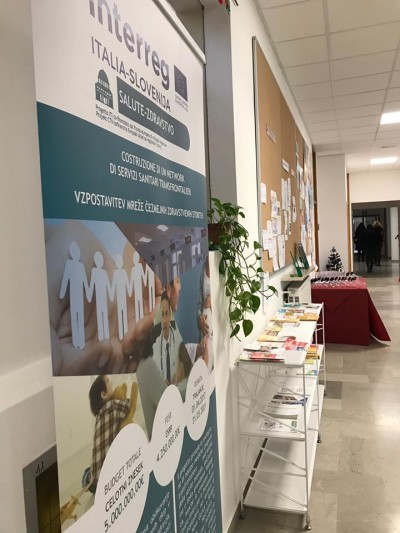
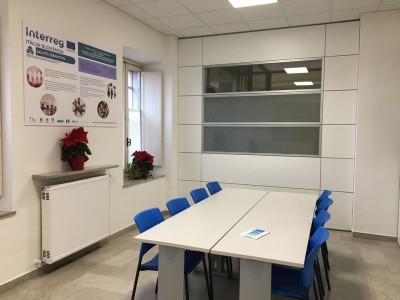
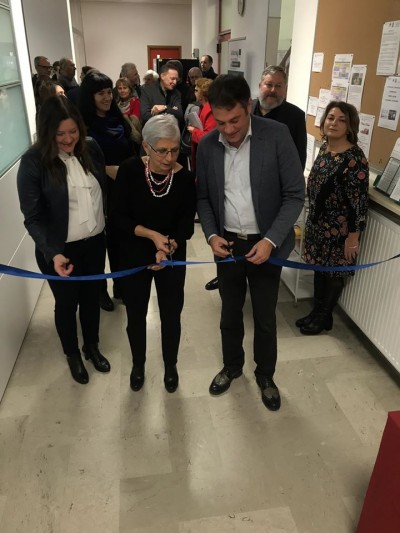
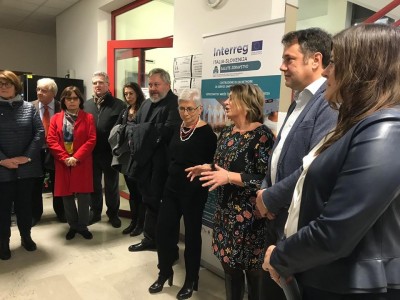
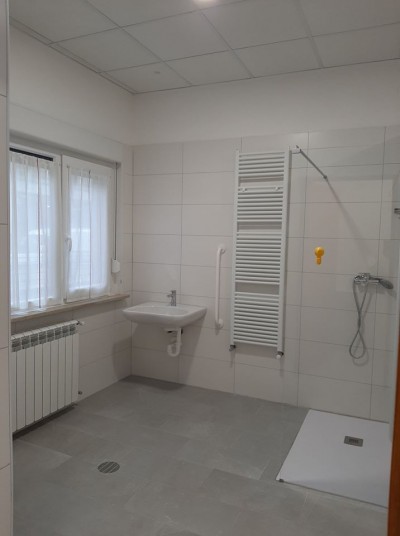
Info point Baiamonti (Gorizia)
Info point Skupnostni center (Nova Gorica)
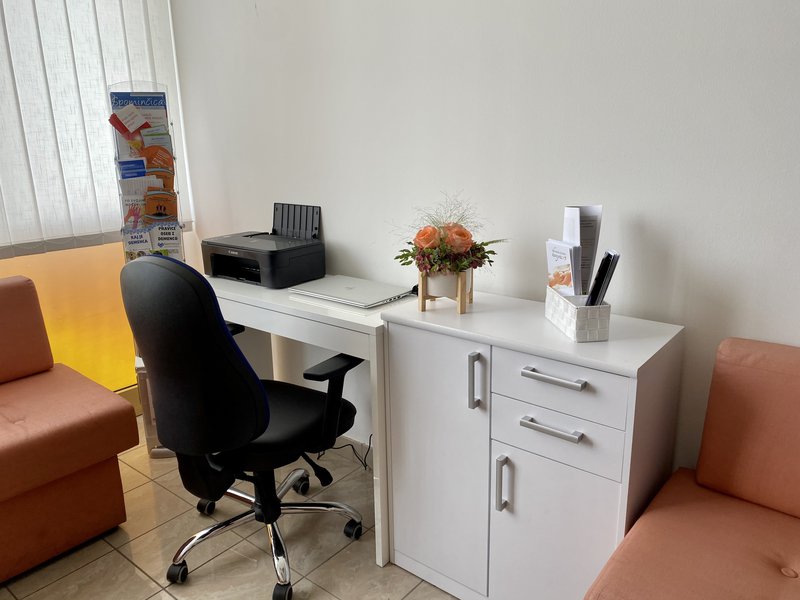
Info point in the Dnevni center za starejše (Šempeter)